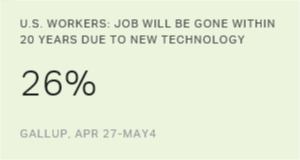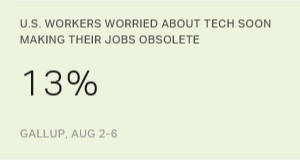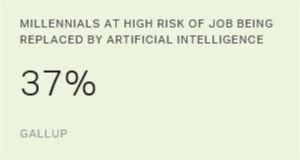Story Highlights
- 76% of Americans say AI will change the way people work and live
- 77% of these U.S. adults say those changes will be positive
- However, 73% say AI adoption will result in net job loss
WASHINGTON, D.C. -- Three in four Americans (76%) agree or strongly agree that artificial intelligence (AI) will fundamentally change the way people work and live over the next decade. Among those who expect this transformation, a similar 77% believe these changes will be "mostly" or "very positive."
| Very/Mostly positive | Very/Mostly negative | No impact | ||||||||||||||||||||||||||||||||||||||||||||||||||||||||||||||||||||||||||||||||||||||||||||||||||
|---|---|---|---|---|---|---|---|---|---|---|---|---|---|---|---|---|---|---|---|---|---|---|---|---|---|---|---|---|---|---|---|---|---|---|---|---|---|---|---|---|---|---|---|---|---|---|---|---|---|---|---|---|---|---|---|---|---|---|---|---|---|---|---|---|---|---|---|---|---|---|---|---|---|---|---|---|---|---|---|---|---|---|---|---|---|---|---|---|---|---|---|---|---|---|---|---|---|---|---|---|
| % | % | % | ||||||||||||||||||||||||||||||||||||||||||||||||||||||||||||||||||||||||||||||||||||||||||||||||||
| Overall | 77 | 23 | * | |||||||||||||||||||||||||||||||||||||||||||||||||||||||||||||||||||||||||||||||||||||||||||||||||
| Age | ||||||||||||||||||||||||||||||||||||||||||||||||||||||||||||||||||||||||||||||||||||||||||||||||||||
| 18 to 35 | 79 | 20 | 1 | |||||||||||||||||||||||||||||||||||||||||||||||||||||||||||||||||||||||||||||||||||||||||||||||||
| 36 to 50 | 75 | 25 | 1 | |||||||||||||||||||||||||||||||||||||||||||||||||||||||||||||||||||||||||||||||||||||||||||||||||
| 51 to 65 | 74 | 26 | * | |||||||||||||||||||||||||||||||||||||||||||||||||||||||||||||||||||||||||||||||||||||||||||||||||
| 66+ | 82 | 17 | * | |||||||||||||||||||||||||||||||||||||||||||||||||||||||||||||||||||||||||||||||||||||||||||||||||
| Education | ||||||||||||||||||||||||||||||||||||||||||||||||||||||||||||||||||||||||||||||||||||||||||||||||||||
| Less than a bachelor's degree | 74 | 25 | 1 | |||||||||||||||||||||||||||||||||||||||||||||||||||||||||||||||||||||||||||||||||||||||||||||||||
| Bachelor's degree or higher | 82 | 18 | * | |||||||||||||||||||||||||||||||||||||||||||||||||||||||||||||||||||||||||||||||||||||||||||||||||
| Job type | ||||||||||||||||||||||||||||||||||||||||||||||||||||||||||||||||||||||||||||||||||||||||||||||||||||
| White collar | 78 | 21 | 1 | |||||||||||||||||||||||||||||||||||||||||||||||||||||||||||||||||||||||||||||||||||||||||||||||||
| Blue collar | 68 | 31 | * | |||||||||||||||||||||||||||||||||||||||||||||||||||||||||||||||||||||||||||||||||||||||||||||||||
| * Less than 0.5% | ||||||||||||||||||||||||||||||||||||||||||||||||||||||||||||||||||||||||||||||||||||||||||||||||||||
| Northeastern University/Â鶹´«Ã½AV survey, Sept. 15-Oct. 10, 2017 | ||||||||||||||||||||||||||||||||||||||||||||||||||||||||||||||||||||||||||||||||||||||||||||||||||||
These data come from a new Northeastern University/Â鶹´«Ã½AV survey of Americans' attitudes toward AI and its effect on their lives and work. The mail survey of 3,297 U.S. adults took place Sept. 15-Oct. 10, 2017. In the survey, AI is defined as computers, robots or other technology that can accomplish tasks humans can do, as well as learn and accomplish tasks that humans may not be able to do.
Similar proportions of white-collar workers (those working in largely salaried industries) and blue-collar workers (those working in industries largely composed of hourly wage earners) strongly agree or agree that AI will fundamentally alter the way people work and live -- 80% vs. 77%, respectively. However, white-collar workers who expect it to have an impact are more optimistic than blue-collar workers are about how it will affect people's lives, with 78% saying those changes will be very or mostly positive, compared with 68% of blue-collar workers who expect AI to have this level of impact.
In line with occupational differences, Americans' optimism about the effect of AI also differs according to their level of education. Among those who expect AI to have a fundamental impact, 82% with a bachelor's degree or higher, vs. 74% of those without a bachelor's degree, say the impact of AI will be very or mostly positive.
Americans Anticipate Negative Effects From AI Adoption
While the public largely believes the impact of AI will be positive, it also anticipates that the technology will have some significant downsides. Chief among these is job loss, with 73% of Americans saying the adoption of AI will result in a loss of more jobs than it creates. White-collar workers (71%) are less likely than blue-collar workers (82%) to say AI adoption will result in a net job loss.
| Create more jobs than AI eliminates | Eliminate more jobs than AI creates | Have no impact on the number of jobs | ||||||||||||||||||||||||||||||||||||||||||||||||||||||||||||||||||||||||||||||||||||||||||||||||||
|---|---|---|---|---|---|---|---|---|---|---|---|---|---|---|---|---|---|---|---|---|---|---|---|---|---|---|---|---|---|---|---|---|---|---|---|---|---|---|---|---|---|---|---|---|---|---|---|---|---|---|---|---|---|---|---|---|---|---|---|---|---|---|---|---|---|---|---|---|---|---|---|---|---|---|---|---|---|---|---|---|---|---|---|---|---|---|---|---|---|---|---|---|---|---|---|---|---|---|---|---|
| % | % | % | ||||||||||||||||||||||||||||||||||||||||||||||||||||||||||||||||||||||||||||||||||||||||||||||||||
| All Americans | 14 | 73 | 13 | |||||||||||||||||||||||||||||||||||||||||||||||||||||||||||||||||||||||||||||||||||||||||||||||||
| Age | ||||||||||||||||||||||||||||||||||||||||||||||||||||||||||||||||||||||||||||||||||||||||||||||||||||
| 18 to 35 | 10 | 78 | 12 | |||||||||||||||||||||||||||||||||||||||||||||||||||||||||||||||||||||||||||||||||||||||||||||||||
| 36 to 50 | 15 | 75 | 11 | |||||||||||||||||||||||||||||||||||||||||||||||||||||||||||||||||||||||||||||||||||||||||||||||||
| 51 to 65 | 14 | 73 | 13 | |||||||||||||||||||||||||||||||||||||||||||||||||||||||||||||||||||||||||||||||||||||||||||||||||
| 66+ | 22 | 63 | 15 | |||||||||||||||||||||||||||||||||||||||||||||||||||||||||||||||||||||||||||||||||||||||||||||||||
| Education | ||||||||||||||||||||||||||||||||||||||||||||||||||||||||||||||||||||||||||||||||||||||||||||||||||||
| Less than a bachelor's degree | 13 | 74 | 13 | |||||||||||||||||||||||||||||||||||||||||||||||||||||||||||||||||||||||||||||||||||||||||||||||||
| Bachelor's degree or higher | 16 | 72 | 12 | |||||||||||||||||||||||||||||||||||||||||||||||||||||||||||||||||||||||||||||||||||||||||||||||||
| Job type | ||||||||||||||||||||||||||||||||||||||||||||||||||||||||||||||||||||||||||||||||||||||||||||||||||||
| White collar | 17 | 71 | 12 | |||||||||||||||||||||||||||||||||||||||||||||||||||||||||||||||||||||||||||||||||||||||||||||||||
| Blue collar | 9 | 82 | 10 | |||||||||||||||||||||||||||||||||||||||||||||||||||||||||||||||||||||||||||||||||||||||||||||||||
| * Among all Americans | ||||||||||||||||||||||||||||||||||||||||||||||||||||||||||||||||||||||||||||||||||||||||||||||||||||
| Northeastern University/Â鶹´«Ã½AV survey, Sept. 15-Oct. 10, 2017 | ||||||||||||||||||||||||||||||||||||||||||||||||||||||||||||||||||||||||||||||||||||||||||||||||||||
In addition to expecting job losses, a majority (63%) of Americans believe the adoption of AI will widen the gap between the rich and the poor. Among white-collar workers and Americans with a bachelor's degree or higher, two in three (66%) of both groups say AI will widen the gap.
| Widen the gap | Narrow the gap | Have no impact | ||||||||||||||||||||||||||||||||||||||||||||||||||||||||||||||||||||||||||||||||||||||||||||||||||
|---|---|---|---|---|---|---|---|---|---|---|---|---|---|---|---|---|---|---|---|---|---|---|---|---|---|---|---|---|---|---|---|---|---|---|---|---|---|---|---|---|---|---|---|---|---|---|---|---|---|---|---|---|---|---|---|---|---|---|---|---|---|---|---|---|---|---|---|---|---|---|---|---|---|---|---|---|---|---|---|---|---|---|---|---|---|---|---|---|---|---|---|---|---|---|---|---|---|---|---|---|
| % | % | % | ||||||||||||||||||||||||||||||||||||||||||||||||||||||||||||||||||||||||||||||||||||||||||||||||||
| All Americans | 63 | 9 | 28 | |||||||||||||||||||||||||||||||||||||||||||||||||||||||||||||||||||||||||||||||||||||||||||||||||
| Age | ||||||||||||||||||||||||||||||||||||||||||||||||||||||||||||||||||||||||||||||||||||||||||||||||||||
| 18 to 35 | 69 | 7 | 24 | |||||||||||||||||||||||||||||||||||||||||||||||||||||||||||||||||||||||||||||||||||||||||||||||||
| 36 to 50 | 60 | 10 | 30 | |||||||||||||||||||||||||||||||||||||||||||||||||||||||||||||||||||||||||||||||||||||||||||||||||
| 51 to 65 | 63 | 8 | 29 | |||||||||||||||||||||||||||||||||||||||||||||||||||||||||||||||||||||||||||||||||||||||||||||||||
| 66+ | 60 | 11 | 29 | |||||||||||||||||||||||||||||||||||||||||||||||||||||||||||||||||||||||||||||||||||||||||||||||||
| Education | ||||||||||||||||||||||||||||||||||||||||||||||||||||||||||||||||||||||||||||||||||||||||||||||||||||
| Less than a bachelor's degree | 62 | 10 | 28 | |||||||||||||||||||||||||||||||||||||||||||||||||||||||||||||||||||||||||||||||||||||||||||||||||
| Bachelor's degree or higher | 66 | 6 | 28 | |||||||||||||||||||||||||||||||||||||||||||||||||||||||||||||||||||||||||||||||||||||||||||||||||
| Job type | ||||||||||||||||||||||||||||||||||||||||||||||||||||||||||||||||||||||||||||||||||||||||||||||||||||
| White collar | 66 | 6 | 28 | |||||||||||||||||||||||||||||||||||||||||||||||||||||||||||||||||||||||||||||||||||||||||||||||||
| Blue collar | 59 | 11 | 29 | |||||||||||||||||||||||||||||||||||||||||||||||||||||||||||||||||||||||||||||||||||||||||||||||||
| * Among all Americans | ||||||||||||||||||||||||||||||||||||||||||||||||||||||||||||||||||||||||||||||||||||||||||||||||||||
| Northeastern University/Â鶹´«Ã½AV survey, Sept. 15-Oct. 10, 2017 | ||||||||||||||||||||||||||||||||||||||||||||||||||||||||||||||||||||||||||||||||||||||||||||||||||||
Americans' views on AI may be at least partly related to a lack of familiarity with the technology, with slightly more than half (55%) saying they have an "excellent" or "good" understanding of what AI is, but 45% saying their understanding is "only fair" or "poor."
Implications
The media have reported extensively about the potential for AI to eliminate large numbers of jobs across the U.S. economy, and Americans agree, with more than seven in 10 saying AI will eliminate more jobs than it creates. While Americans agree that AI adoption will result in a net loss of jobs, they remain largely positive about the impact the new technology will have on their lives and work over the next decade.
Developing and implementing policies that pre-emptively tackle or respond to the negative effects of AI adoption will prove a key challenge for government, industry and education. Encouraging Americans to prepare to succeed in this rapidly changing economy by obtaining the additional education necessary to work with AI will also prove a major task. However, not doing so would only exacerbate the disruption of people's lives and work that the adoption of AI is already likely to create.
Read the full Northeastern University/Â鶹´«Ã½AV report "Optimism and Anxiety: Views on the Impact of Artificial Intelligence and Higher Education's Response."
Survey Methods
Results for the Northeastern University/Â鶹´«Ã½AV survey on artificial intelligence are based on surveys conducted by mail from Sept. 15-Oct. 10, 2017, with a random sample of 3,297 U.S. adults aged 18 and older. The survey package included an English and a Spanish survey to provide respondents with the flexibility to reply in their preferred language.
Â鶹´«Ã½AV selected the sample of U.S. residents using address-based sampling (ABS), a sampling technique used to select households from a list of all households on file with the United States Postal Service (USPS). Â鶹´«Ã½AV chooses respondents within the household at random based on which household member would have the next birthday. Â鶹´«Ã½AV used a series of postcard reminders to encourage participation in the survey.
Â鶹´«Ã½AV weighted the data to match national demographics of gender, age, education, race, Hispanic ethnicity, education and region.
All reported margins of sampling error include computed design effects for weighting.





